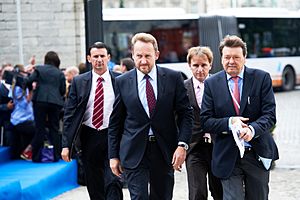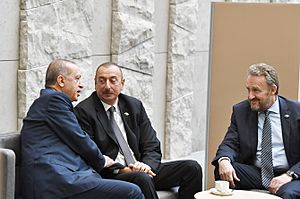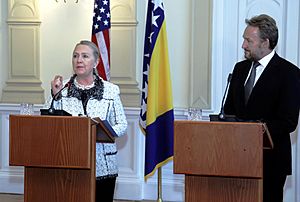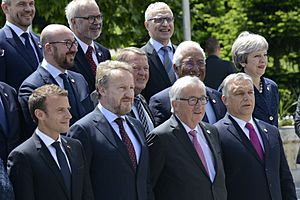Bakir Izetbegović facts for kids
Quick facts for kids
Bakir Izetbegović
|
|||||||||||||||||
|---|---|---|---|---|---|---|---|---|---|---|---|---|---|---|---|---|---|

Izetbegović in 2025
|
|||||||||||||||||
| 14th Chairman of the Presidency of Bosnia and Herzegovina | |||||||||||||||||
| In office 17 March 2018 – 20 November 2018 |
|||||||||||||||||
| Preceded by | Dragan Čović | ||||||||||||||||
| Succeeded by | Milorad Dodik | ||||||||||||||||
| In office 17 March 2016 – 17 November 2016 |
|||||||||||||||||
| Preceded by | Dragan Čović | ||||||||||||||||
| Succeeded by | Mladen Ivanić | ||||||||||||||||
| In office 10 March 2014 – 17 November 2014 |
|||||||||||||||||
| Preceded by | Željko Komšić | ||||||||||||||||
| Succeeded by | Mladen Ivanić | ||||||||||||||||
| In office 10 March 2012 – 10 November 2012 |
|||||||||||||||||
| Preceded by | Željko Komšić | ||||||||||||||||
| Succeeded by | Nebojša Radmanović | ||||||||||||||||
| 6th Bosniak Member of the Presidency of Bosnia and Herzegovina | |||||||||||||||||
| In office 10 November 2010 – 20 November 2018 |
|||||||||||||||||
| Prime Minister | Nikola Špirić Vjekoslav Bevanda Denis Zvizdić |
||||||||||||||||
| Preceded by | Haris Silajdžić | ||||||||||||||||
| Succeeded by | Šefik Džaferović | ||||||||||||||||
| President of the Party of Democratic Action | |||||||||||||||||
| Assumed office 25 September 2014 Acting: 25 September 2014 – 26 May 2015 |
|||||||||||||||||
| Preceded by | Sulejman Tihić | ||||||||||||||||
|
|||||||||||||||||
| Personal details | |||||||||||||||||
| Born | 28 June 1956 Sarajevo, Yugoslavia |
||||||||||||||||
| Political party | Party of Democratic Action (from 1990) | ||||||||||||||||
| Spouse |
Sebija Građević
(m. 1983) |
||||||||||||||||
| Children | 1 | ||||||||||||||||
| Parent |
|
||||||||||||||||
| Alma mater | University of Sarajevo (BArch) | ||||||||||||||||
| Signature |  |
||||||||||||||||
Bakir Izetbegović (born 28 June 1956) is a Bosnian politician. He served as the Bosniak member of the Presidency of Bosnia and Herzegovina from 2010 to 2018. He is also the current president of the Party of Democratic Action (SDA).
Born in Sarajevo in 1956, Bakir Izetbegović is the son of Alija Izetbegović. His father was the first president of the Republic of Bosnia and Herzegovina. Bakir studied architecture at the University of Sarajevo and graduated in 1981. He worked in architectural firms before entering politics.
He became involved in politics in 2000. In 2006, he was elected to the national Parliamentary Assembly of Bosnia and Herzegovina. In 2010, he was elected as the Bosniak member of the Bosnian Presidency. He was re-elected for a second term in 2014.
During his time in the Presidency, Bosnia and Herzegovina faced challenges. These included major floods in 2014 and some public protests. After leaving the Presidency in 2018, he became a member of the national House of Peoples of Bosnia and Herzegovina. He served there until 2023.
Bakir Izetbegović has been a member of the SDA party since it started in 1990. He has been the party's president since 2014. He is known for being a strong leader within his party.
Contents
Early Life and Education
Bakir Izetbegović was born in Sarajevo, which was then part of Yugoslavia, on 28 June 1956. His parents were Alija Izetbegović and Halida Repovac. His father later became the first President of independent Bosnia and Herzegovina.
Bakir went to primary and high school in Sarajevo. He then studied at the Faculty of Architecture at the University of Sarajevo. He finished his studies in 1981. From 1982 to 1992, he worked as a consultant for an architectural company.
He also helped with many community activities. He was part of the management boards for sports clubs like FK Sarajevo and KK Bosna Royal. He was also a member of the Muslim Humanitarian Society "Merhamet" and the Council of the Islamic Community of Bosnia and Herzegovina.
Start of Political Career
Bakir Izetbegović's father helped him prepare for a future in politics.
From 1991 to 2003, Bakir was the director of the Construction Institute of the Sarajevo Canton. He officially started his political career in 2000. After working in two regional assemblies, he was elected to the national Parliament in 2006.
In 2000, he became the Deputy Head of his father's Party of Democratic Action (SDA) group in the Assembly of the Sarajevo Canton. He took on similar roles at higher levels. He served in the House of Representatives of the Federation of Bosnia and Herzegovina from 2002 to 2007. Then, he was in the national House of Representatives of Bosnia and Herzegovina from 2007 to 2010. He also led the Bosnian Parliament's group in the Parliamentary Assembly of the Council of Europe.
Izetbegović has been a member of the SDA party since it was founded in 1990. He joined the party's main leadership group in 2002. In May 2015, he was elected as the president of the Party of Democratic Action. He took over from Sulejman Tihić.
Time in the Presidency (2010–2018)
In the 2010 general election, Bakir Izetbegović was elected as the Bosniak member of the Presidency of Bosnia and Herzegovina. He received the most votes among nine candidates.
Domestic Issues and Re-election

In February 2011, Izetbegović attended a meeting in New York City. The meeting was about the Dayton Agreement, which ended the Bosnian War. It was organized by the Clinton Foundation.
In the 2014 general election, Izetbegović ran for a second term in the Presidency. He won with 32.8% of the votes and was re-elected. During his election campaign, he promised to create 100,000 new jobs.
In November 2017, he spoke about the importance of keeping Bosnia and Herzegovina united. He also said that Bosnia and Herzegovina should recognize the independence of Kosovo.
On 7 October 2018, Šefik Džaferović won the election for the Bosniak member of the Presidency. Džaferović is also from Izetbegović's SDA party. He took over from Izetbegović. During his two terms, Izetbegović served as the Chairman of the Presidency four times.
Working on Constitutional Reform
During his time in office, there were many discussions about changing the constitution of Bosnia and Herzegovina. These talks aimed to improve how the country is governed. They also focused on making sure all citizens have equal rights.
One main goal was to follow a court ruling called the Sejdić–Finci ruling. This ruling said that the country's election laws needed to be changed. The goal was to remove rules that discriminated against certain groups.
Many meetings were held with European and American officials. Political leaders from Bosnia and Herzegovina, including Izetbegović, took part. They tried to find solutions to these complex issues. Despite many efforts, a full agreement on these reforms was not reached during his presidency.
Foreign Relations
In June 2012, Izetbegović spoke out when Serbian President Tomislav Nikolić did not recognize the Srebrenica massacre as an act of genocide. Izetbegović said this was disrespectful to the survivors. Later, Nikolić apologized for crimes committed in Serbia's name, especially in Srebrenica.
In October 2012, Izetbegović and other Presidency members met with United States Secretary of State Hillary Clinton in Sarajevo. In June 2015, Izetbegović met with Pope Francis in Sarajevo. This was part of the Pope's visit to Bosnia and Herzegovina. In May 2018, Izetbegović attended a summit in Sofia, Bulgaria, with other European leaders.
Ties with Turkey

Bosnia and Herzegovina and Turkey have strong historical ties. These connections date back to the time of the Ottoman Empire. Many people in Bosnia have Turkish heritage.
In 2016, the Turkish government started a project to teach Bosnian in its schools. Classes began in 2018, especially in areas with people from the Balkans.
The Turkish government has also helped rebuild historic mosques in Bosnia. These mosques were damaged during the Bosnian War. Examples include the Aladža Mosque and the Arnaudija Mosque.
After the Presidency (2018–Present)
After his two terms in the Presidency ended in 2018, Bakir Izetbegović continued his political work. In February 2019, he became a member of the national House of Peoples of Bosnia and Herzegovina. On 28 February 2019, he was chosen as the new chairman of the House of Peoples. He served in this role until February 2023.
In June 2022, Izetbegović announced he would run for the Presidency again in the 2022 general election. However, he was not elected. Denis Bećirović won the Bosniak member seat instead.
Personal Life
Bakir Izetbegović married Sebija Građević in 1983. They have one daughter named Jasmina, who was born in 1984. Jasmina is a graphic designer. She owns a marketing agency that works with some state-owned companies. On 27 August 2021, Jasmina got married in Sarajevo. Turkish President Recep Tayyip Erdoğan attended the wedding as a godfather.
In October 2020, it was confirmed that Izetbegović had COVID-19. In May 2021, he received his first dose of the Pfizer–BioNTech COVID-19 vaccine.
See also
 In Spanish: Bakir Izetbegović para niños
In Spanish: Bakir Izetbegović para niños
 | Shirley Ann Jackson |
 | Garett Morgan |
 | J. Ernest Wilkins Jr. |
 | Elijah McCoy |



